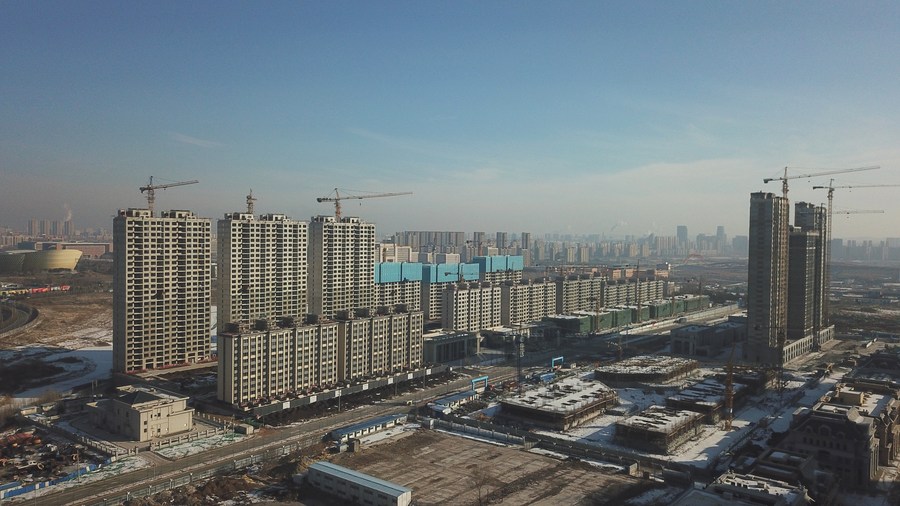
Aerial photo taken on Feb. 17, 2020 shows buildings under construction in Nanguan District of Changchun City, northeast China's Jilin Province.(Xinhua/Zhang Nan)
BEIJING, March 16 (Xinhua) -- Major Chinese cities in general reported rising home prices last month, adding to evidence of a stabilizing property sector, official data showed Thursday.
In February, 55 out of 70 large and medium-sized cities saw month-on-month increases in new home prices, up from 36 in January, according to the National Bureau of Statistics (NBS). Meanwhile, 40 cities witnessed higher resale home prices, up from 13 in the previous month.
Remarking on the data, Sheng Guoqing, the bureau's senior statistician, said the effect of government policies to stabilize the property market gradually appeared and housing demand was also further unleashed.
New home prices in four first-tier cities -- Beijing, Shanghai, Shenzhen and Guangzhou -- edged up 0.2 percent month-on-month, the same growth rate as in January.
In 31 second-tier cities, prices of new homes gained 0.4 percent, picking up pace from the 0.1-percent increase a month earlier. New housing in 35 third-tier cities saw prices up 0.3 percent, reversing a 0.1-percent drop registered in January.
Warming signs were also seen on the second-hand market as prices went up 0.7 percent and 0.1 percent month on month in first and second-tier cities, respectively, while such prices remained flat in third-tier cities to end a losing streak.
China's property market went through a tough year in 2022, pounded by factors such as COVID-19 resurgences, dented market confidence and shrinking demand.
As a "pillar" of the economy, the property sector combined with the construction industry contributes 13 percent of the country's gross domestic product.
Policymakers have rolled out a flurry of supportive measures to shore up this sector, including encouraging commercial banks to grant loans to fund real estate projects and allowing cities to adjust the lower limit for first-home mortgage rates.
Positive changes have been seen in the real estate market since the beginning of the year. In January and February combined, the property investment decline narrowed and home sales logged smaller drops in both floor area and value, official data showed Wednesday.
NBS spokesperson Fu Linghui told a press conference Wednesday the property market is still under adjustment and will gradually stabilize with the improvement of the overall economy and market expectations.
While the latest market signals are encouraging, the question now is how to reinforce this trend, while also ensuring that no risk will emerge in the course of the property market recovery.
Ni Hong, minister of housing and urban-rural development, unveiled an array of policies during the country's "two sessions" earlier this month, including adopting city-specific measures to satisfy housing demand and developing the long-term rental market for new urban residents and young people.
Housing is for living in and not for speculation, real housing demand should be guaranteed, and sharp ups and downs in the market should be avoided, Ni said, noting that the property market recovery should also be in line with high-quality development.
This year's government work report said efforts will be made to prevent unregulated expansion in the real estate market and promote stable development.
Comparing the property sector risk to a "gray rhino," Ni said it is necessary to ensure that the sectoral risk does not interweave with risks in the financial sector and local government debts and lead to a systemic risk.




 A single purchase
A single purchase









